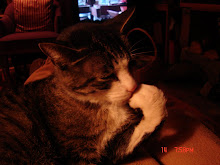I had the least identification with Tante Jo. Johanna Hogenkamp was the eldest of Oma's three children and she brought the greatest honour to our family. Her long career in education received many accolades and public honours while she lived a most ordinary and private personal life. She was the "man" of the family, the caretaker, overseeing the budget, and insuring Oma's well being. While Ina could take risks and be more flamboyant, it was Jo's steady dedication to duty that made Ina's freedom possible.
My recollections are of a jolly, humorous and generous woman, who loved nature, books and enjoyed reading to me. Not having the cursed hair lip like Ina, gave her an advantage in the marriage market. She had been prettier, less haughty, and more popular. My father said that she had received an offer of marriage and was seriously considering it when it all fell through due to some interference from her mother. My father darkened when he reflected on it. The fiance was deemed unsuitable in some way and that ended all discussion. Since social class was very important, I suspect that he was not from the right class.
If Jo was disappointed, she didn't show it. Being of a practical nature, she concentrated on her education and forged a career in teaching and later curriculum development and administration. It was a great concern to Jo that while working class boys could be educated in trade schools, there was nothing available to working class girls. How were these young women to support themselves in the absence of husbands and fathers. The war was a great leveler and Jo saw first hand the hardships endured by a nation without men.
Men between 16 and 45 were routinely rounded up and deported to German labour camps where conditions were very harsh. Many never returned. There would be sudden raids where whole districts were cordoned off while soldiers went from house to house rounding up the men and boys. A branch of the resistance became amazingly adept at anticipating which neighbourhood would be next and getting the warning out. Over time, fewer men would be caught in the German net. Although Nazi propaganda told the Dutch they were Aryan brothers, the Nazis, in reality, had no qualms about enslaving their "brothers" as needed.
Jo designed a trade school for girls that taught all the skills a girl would need to be employed in domestic service, hospitals, business and light industry. Looking from this point in time, it seems such a sexist concept, but in post war Holland, it was revolutionary. Jo lobbied tirelessly and eventually a pilot school was begun in Den Haag. In very short order schools for working class girls were launched throughout Holland and their success underlined the state's recognition that women needed to be self sufficient in a post war Holland. In the late forties and early fifties women outnumbered men. She was Principal of the pilot school, wrote books and lectured on the subject.
In today's society, equal education for both genders of all social strata is the norm. Jo's girls schools are long gone: an anachronism. But, it should be remembered that they paved the way for social change in education. Fortunately the Ridder Order advisory committee recognized Jo's pioneering role in education and she was invested a Knight in the House of Orange by HRH Queen Julianna. The van den Bergs finally stopped patronizing my Oma after that.
Meanwhile, Tante Jo continued to be the stable family caretaker. She read every book Dutch, and English on her towering bookshelves, continued to write articles for education journals and enjoyed the simple pleasures of a daily walk in the dunes by the sea. Her greatest enjoyment came from children's literature and she continued to revue them well into her retirement.
I don't think it ever crossed her mind to regret her unmarried status.
skip to main |
skip to sidebar

Facebook Badge
About Me

- kingmisha
- I'm bigger than a pile of breadboxes, but smaller than a Sherman tank. I'm overeducated, underpaid but very content with my life. I have loved infrequently but intensely. I dated a poet, divorced a Dean, had an affair with a jazz pianist, was engaged to a diplomat, and widowed by my child's father. The men in my life were all very special. Not all grand passions but much loved in their time: Leonard Cohen, Alfred Pinsky, Billy Horn, Wendell Goodin, and Elliot Hirschman. Thanks for the memories... I'm a lapsed artist which doesn't really trouble me because I'm a very successful parent. I lacked the requisite conceit to persevere as an artist. I just couldn't make myself believe that my art came before my child. The world really doesn't need another sculptor (even a good one), but it does need another good human being. It can use all the good human beings we can turn out. I present Mambolica as my evidence so judge for yourselves.
